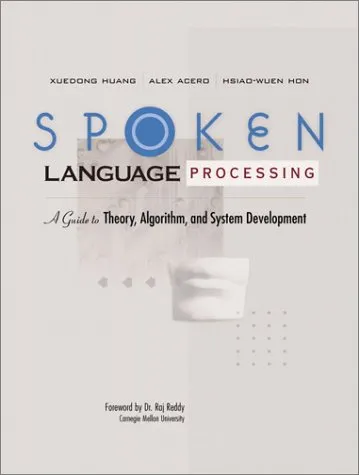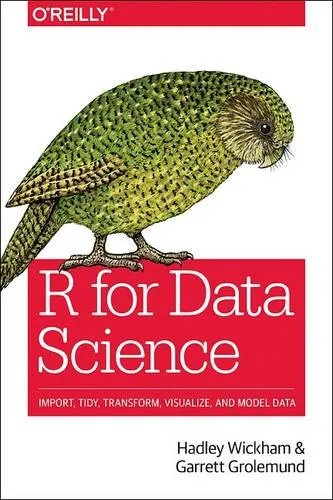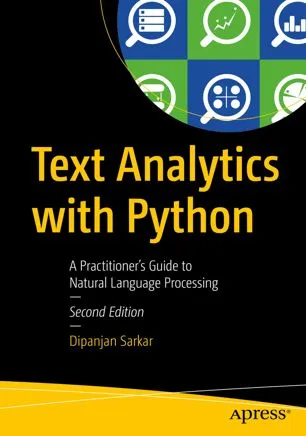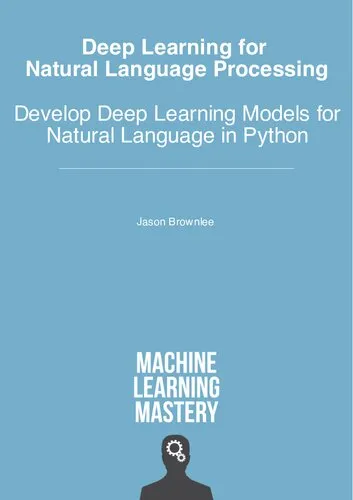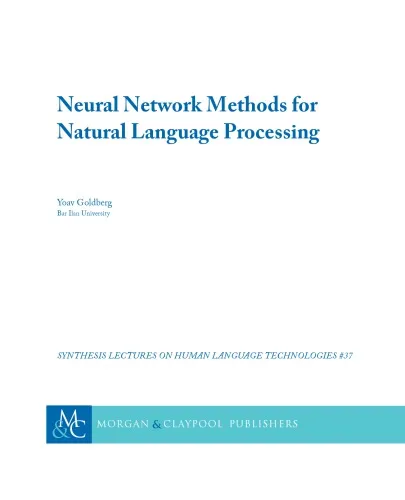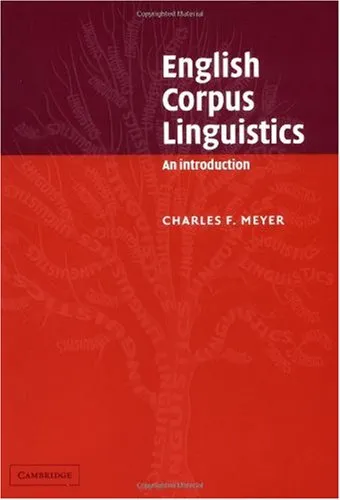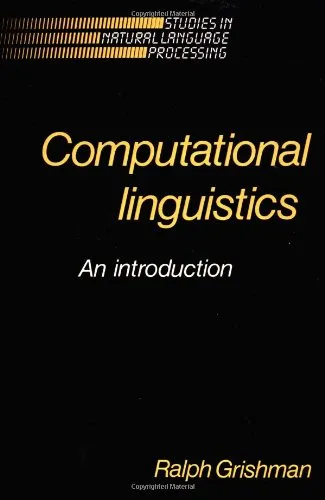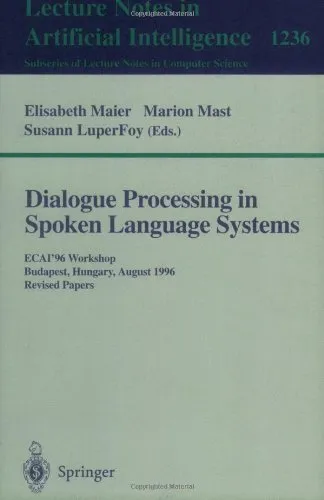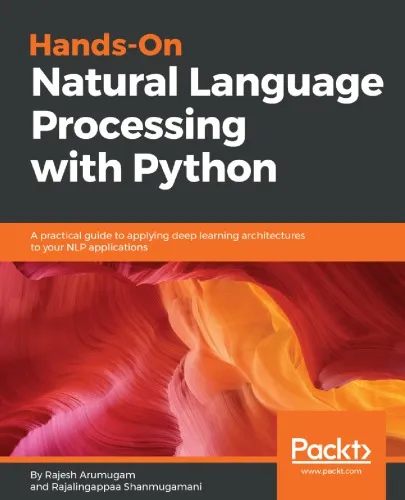Spoken Language Processing: A Guide to Theory, Algorithm and System Development
4.5
بر اساس نظر کاربران

شما میتونید سوالاتتون در باره کتاب رو از هوش مصنوعیش بعد از ورود بپرسید
هر دانلود یا پرسش از هوش مصنوعی 2 امتیاز لازم دارد، برای بدست آوردن امتیاز رایگان، به صفحه ی راهنمای امتیازات سر بزنید و یک سری کار ارزشمند انجام بدینکتاب های مرتبط:
معرفی جامع کتاب Spoken Language Processing
کتاب Spoken Language Processing: A Guide to Theory, Algorithm and System Development یکی از جامعترین و برجستهترین منابع در حوزه پردازش زبان گفتاری است. این کتاب، نوشته مشترک ما - شوئدونگ هوانگ، آلکس آسرو و هسیائو-ون هان - تلاش میکند تا به طور جزئی و دقیق، تمام جنبههای نظری، الگوریتمی و عملیاتی مربوط به پردازش گفتار را پوشش دهد.
پردازش زبان گفتاری، که به بررسی تعاملات کامپیوتر و انسان از طریق گفتار میپردازد، یکی از پویاترین و مهمترین حوزهها در علوم کامپیوتر است. این کتاب، دانشجویان، محققان و متخصصین این حوزه را به دانش جامعی از مفاهیم پایه و پیشرفته مجهز میسازد و برای کسانی که به دنبال توسعه سیستمهای پیچیده مانند Speech Recognition، Text-to-Speech، Natural Language Processing و دیگر زمینههای مرتبط هستند، راهنمایی حیاتی ارائه میدهد.
خلاصهای از محتوای کتاب
کتاب Spoken Language Processing به چهار بخش اصلی تقسیم شده است. این بخشها به ترتیب، پوشش دهنده نظریههای بنیادین، ابزارهای الگوریتمی، سیستمها و کاربردها و در نهایت آینده این حوزه هستند.
- بخش اول: مبانی نظری - این بخش به مفاهیمی مانند آواشناسی (Phonetics)، واجشناسی (Phonology) و مدلهای پایه مانند Hidden Markov Models (HMMs) پرداخته و اصول اولیه را تشریح میکند.
- بخش دوم: الگوریتمها - در این بخش، کلاسهای مختلف الگوریتمها شامل Acoustic Modeling، Language Modeling و Deep Learning شرح داده میشوند.
- بخش سوم: توسعه سیستمها - در این قسمت، فرآیند طراحی و پیادهسازی سیستمهای واقعی شامل هماهنگسازی دادهها، بهینهسازی عملکرد و مدیریت خطا بررسی میشود.
- بخش چهارم: افقهای آینده - در نهایت، چشمانداز آینده پردازش زبان گفتاری، مسائل اخلاقی و چالشهای موجود مورد بحث قرار میگیرد.
نکات کلیدی که از این کتاب میآموزید
- آشنایی با روشهای پیشرفته در Speech Recognition و Text-to-Speech.
- درک عمیق از مدلهای آکوستیک و زبانی مانند HMM، سیگنالپردازی و Deep Neural Networks.
- توانایی طراحی، توسعه و آزمایش سیستمهای پردازش گفتاری در سطح صنعتی.
- آگاهی از چالشها و فرصتهای موجود در پردازش زبان گفتاری.
نقلقولهای معروف از کتاب
"The ultimate goal of spoken language processing is not merely understanding words but understanding meaning and intent."
"Integration of phonetics and machine learning is essential to building reliable systems."
چرا این کتاب مهم است؟
کتاب Spoken Language Processing به دلیل جامعیت، عمق علمی و تمرکز بر اصول و کاربردهای عملی، یکی از کتب مرجع در این حوزه است. این کتاب، حلقه ارتباطی بین تئوریهای پیچیده و پیادهسازیهای واقعی در دنیای واقعی را فراهم کرده و ابزارهای لازم را برای هر کسی که مایل به پیشرفت در زمینه پردازش گفتار است، ارائه میدهد.
علاوه بر جنبههای علمی، این کتاب به طور ویژه به کاربردپذیری و نیازهای موجود در بازار کار نیز توجه میکند. بنابراین، میتوان گفت که این کتاب هم برای دانشجویان و محققین و هم برای صنعتگران از اهمیت بسیاری برخوردار است.
Introduction to Spoken Language Processing: A Guide to Theory, Algorithm, and System Development
Written by Xuedong Huang, Alex Acero, and Hsiao-Wuen Hon, Spoken Language Processing serves as a cornerstone for understanding the complexities of speech recognition, spoken language systems, and natural language understanding. Exhaustive, precise, and forward-thinking, this book deep-dives into the theoretical, technological, and practical aspects of processing human speech, making it an invaluable resource for researchers, engineers, and students alike.
Detailed Summary of the Book
The book offers a broad, yet detailed, exploration of spoken language processing, from theoretical frameworks to algorithmic techniques and system-level application development. It begins with the fundamentals, such as the nature of human speech, its acoustic and linguistic properties, and the challenges posed in computational modeling.
One of the highlights of the book is its comprehensive approach toward speech recognition algorithms, where it covers methods ranging from statistical modeling (e.g., Hidden Markov Models) to advanced signal processing and machine learning. It also delves into key technologies like language modeling, acoustic feature extraction, decoding algorithms, and speaker adaptation, ensuring that readers develop a coherent understanding of the entire speech recognition pipeline.
The latter sections focus on robust system development and practical implementations for spoken language applications, such as conversational agents, dialogue systems, and language translation tools. Each topic is explained with a balance of clarity and mathematical depth, equipping readers with both conceptual insights and practical tools for real-world applications.
The authors also emphasize the interdisciplinary nature of the field, drawing connections among linguistics, artificial intelligence, psychology, and computer science. By doing so, they encourage readers to recognize that spoken language processing is not just a technical problem but also a profound exploration of human communication.
Key Takeaways
- An in-depth understanding of the theoretical underpinnings of spoken language processing, including statistical and linguistic models.
- Step-by-step guidance on algorithm design for speech recognition, language modeling, and acoustic processing.
- A practical framework for building and evaluating spoken language systems, with insights into error analysis and system optimization.
- Exploration of real-world applications in natural language understanding, dialogue systems, and multilingual processing.
- Interdisciplinary perspectives, connecting computational methods with insights from linguistics, psychology, and AI.
Famous Quotes from the Book
"Speech is the most natural form of human communication, and it poses one of the most challenging frontiers in artificial intelligence."
"The marriage of linguistic insights and statistical methods is at the heart of modern spoken language systems."
"Building a robust system requires not just algorithms, but also a keen understanding of the variability and unpredictability of human speech."
Why This Book Matters
Spoken Language Processing holds immense value for anyone involved in the fields of speech technology, linguistics, or AI-driven communication systems. It is one of the first books to provide a holistic view of a domain as complex and interdisciplinary as spoken language processing, and it has helped shape the careers of countless engineers and researchers.
The book addresses not only the technical challenges but also the societal implications of developing systems that understand and generate human speech. In an era where voice interfaces are increasingly common — from smart speakers to automated customer service agents — this book equips innovators with the knowledge to design systems that are efficient, inclusive, and ethical.
Whether you are a seasoned professional in the field or a curious newcomer, this book serves as a comprehensive guide for mastering the intricacies of spoken language processing and contributing to the advancement of technology that bridges the gap between machines and human communication.
دانلود رایگان مستقیم
شما میتونید سوالاتتون در باره کتاب رو از هوش مصنوعیش بعد از ورود بپرسید
دسترسی به کتابها از طریق پلتفرمهای قانونی و کتابخانههای عمومی نه تنها از حقوق نویسندگان و ناشران حمایت میکند، بلکه به پایداری فرهنگ کتابخوانی نیز کمک میرساند. پیش از دانلود، لحظهای به بررسی این گزینهها فکر کنید.
این کتاب رو در پلتفرم های دیگه ببینید
WorldCat به شما کمک میکنه تا کتاب ها رو در کتابخانه های سراسر دنیا پیدا کنید
امتیازها، نظرات تخصصی و صحبت ها درباره کتاب را در Goodreads ببینید
کتابهای کمیاب یا دست دوم را در AbeBooks پیدا کنید و بخرید
1403
بازدید4.5
امتیاز0
نظر98%
رضایتنظرات:
4.5
بر اساس 0 نظر کاربران
Questions & Answers
Ask questions about this book or help others by answering
No questions yet. Be the first to ask!
